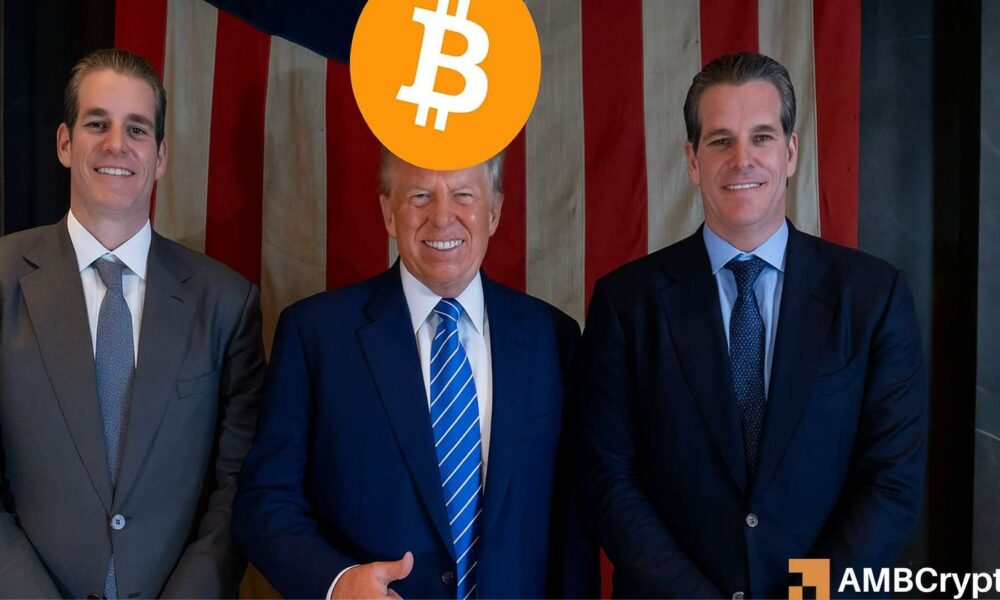Winklevoss Twins Back Pro-Crypto Candidates with $21M BTC Donation
In a bold move to shape the future of cryptocurrency in the United States, Tyler and Cameron Winklevoss, the founders of Gemini, have donated $21 million worth of Bitcoin (BTC) to the newly established Digital Freedom Fund PAC. This initiative aims to support pro-crypto candidates in the upcoming 2026 midterm elections while striving for a “thoughtful” market structure bill that aligns with their vision of making America the cryptocurrency capital of the world. In a landscape where regulatory changes are crucial, the Winklevoss twins’ move serves as a significant push to secure existing gains made during the Trump administration regarding cryptocurrency regulation.
The Vision for a Pro-Crypto Future
Tyler Winklevoss has articulated the mission of the Digital Freedom Fund: to fulfill former President Donald Trump’s vision of a crypto-friendly nation. According to him, success in the 2026 midterm elections will be pivotal in advancing legislation that supports the cryptocurrency ecosystem. The PAC plans to fund candidates who are aligned with their objective of promoting a robust legal framework around Bitcoin and other cryptocurrencies. This framework includes advocating for the Bitcoin Bill of Rights and other legislative efforts aimed at solidifying the position of cryptocurrencies within the American financial landscape.
Importance of Winning the Midterms
The Winklevoss twins emphasize the necessity for Republicans to regain control of both the Senate and the House in the upcoming midterm elections. Tyler has warned that failure to secure these seats would allow Democrats to potentially impede Trump’s pro-crypto agenda. He argues that the Democrats may engage in tactics that could slow progress in establishing favorable conditions for cryptocurrency development. As the political dynamics unfold, the implications for the crypto landscape in the U.S. could be substantial, affecting everything from regulatory policies to investment opportunities.
Advocating for Thoughtful Legislation
A central component of the Winklevoss twins’ strategy is to advocate for a streamlined and effective market structure bill. Tyler describes their vision of legislation as “skinny” and “mean,” focusing on capping government overreach while enabling innovation within the industry. Key aspects of the proposed legislation include pushing back against Central Bank Digital Currencies (CBDCs), fostering open banking initiatives, protecting protocol developers, and ensuring individuals retain the right to self-custody their assets. This approach is in stark contrast to more restrictive regulatory frameworks that could stifle growth and innovation in the crypto space.
The Rise of Pro-Crypto PACs and Industry Support
As pro-crypto PACs gain momentum ahead of the 2026 midterms, the landscape is becoming increasingly dynamic. Recently, Trump’s crypto advisor, David Bailey, unveiled a $200 million plan aimed at solidifying BTC’s position in U.S. policy. The actions taken since early 2025, including the reversal of previous Biden-era SEC enforcement actions, have excited crypto investors and advocates. Many are rallying behind the Winklevoss twins’ initiative, viewing it as a timely step toward fortifying the political landscape in favor of cryptocurrencies. This collective enthusiasm underscores the high stakes involved for the industry as it navigates a politically charged environment.
Criticism and Concerns Over Influence
Despite the wave of support from the crypto community, the Winklevoss twins’ considerable donation has not gone unnoticed by critics who argue that such financial contributions may represent a form of “pay to play.” Researcher Peter Ryan commented on this practice, suggesting that it benefits only a select group of wealthy individuals while eroding democratic freedoms and financial sovereignty. This critical perspective raises important questions about the implications of money in politics, especially in a rapidly evolving sector like cryptocurrency. Balancing the need for advocacy with ethical considerations remains a challenge.
Conclusion: The Future of Crypto in Politics
The Winklevoss twins’ $21 million donation to the Digital Freedom Fund PAC marks a strategic move in the quest for a favorable regulatory environment for cryptocurrency. As the 2026 midterm elections approach, the focus will be on securing pro-crypto candidates who can effectively champion policies that will benefit the sector. While the potential for significant advancements exists, the path forward is fraught with both opportunities and challenges. As the conversation about cryptocurrency becomes increasingly intertwined with politics, it will be essential for stakeholders to navigate this landscape thoughtfully, ensuring that the interests of both innovators and everyday investors are adequately represented.


